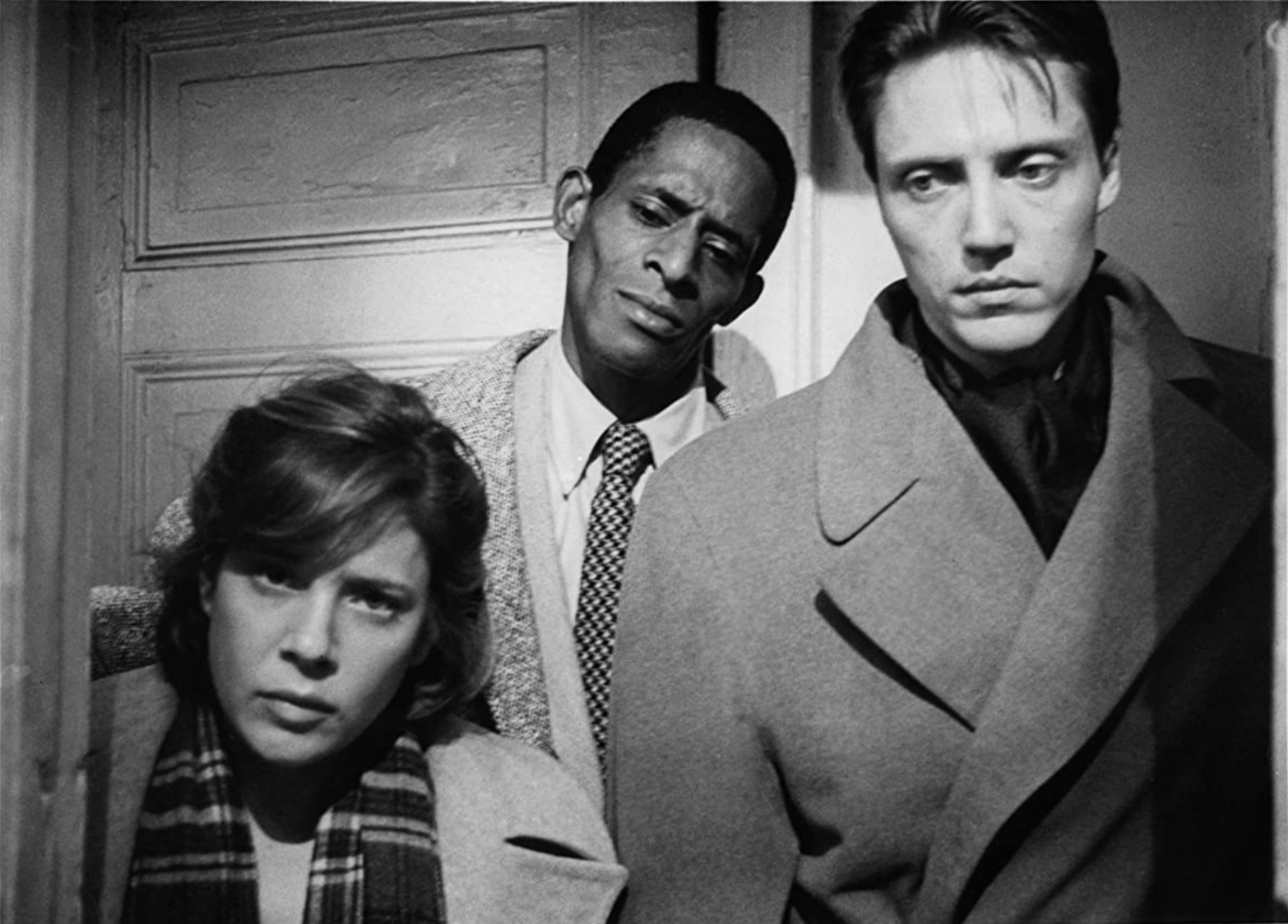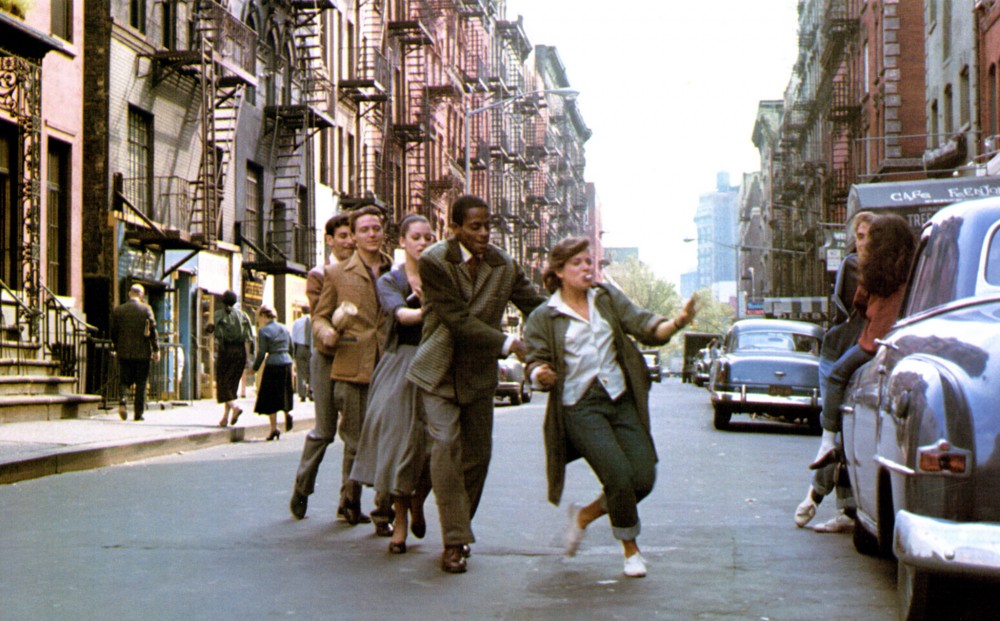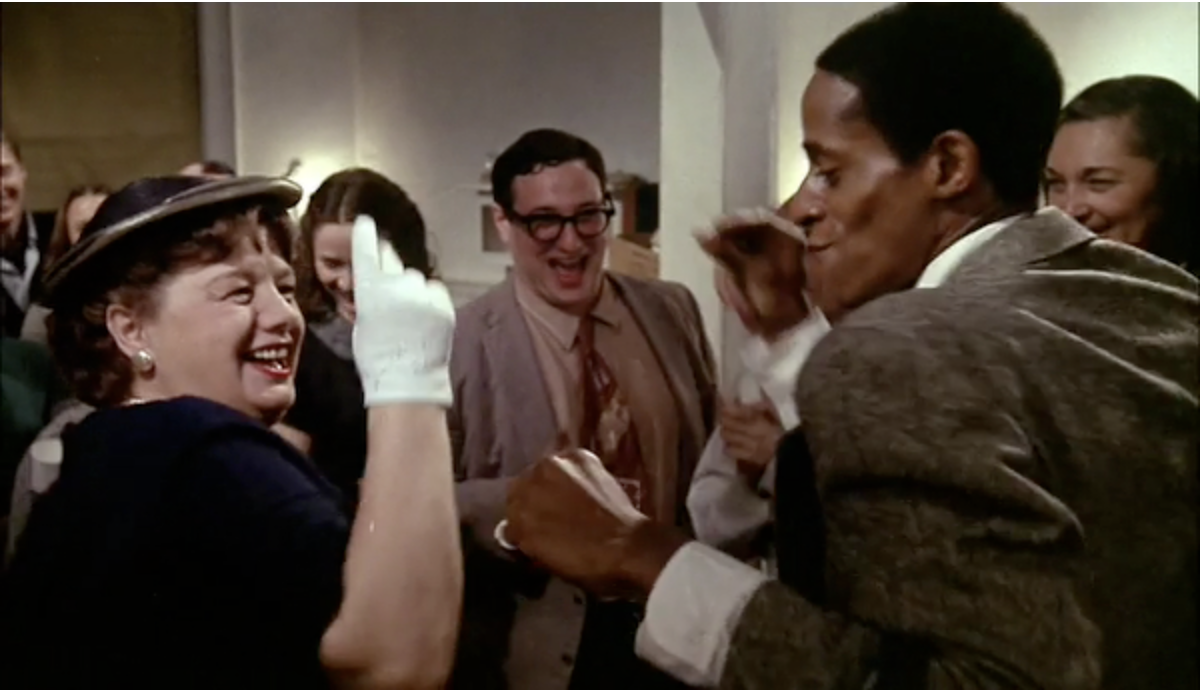Gay Best Friend: Bernstein (Antonio Fargas) in "Next Stop Greenwich Village" (1976)
 Tuesday, August 24, 2021 at 6:30PM
Tuesday, August 24, 2021 at 6:30PM A series by Christopher James looking at the 'Gay Best Friend' trope
 Look past the early "Chris" Walken appearance, Bernstein (Antonio Fargas - center) is the subject of this week's Gay Best Friend column.
Look past the early "Chris" Walken appearance, Bernstein (Antonio Fargas - center) is the subject of this week's Gay Best Friend column.
Flying the nest can be simultaneously liberating and horrifying. On one hand, you have all this freedom to do what you want, when you want. Unfortunately, you have to learn how to take care of yourself and be self-sufficient. For those with tight knit families or over-involved parents, the horrifying can outweigh the liberating.
Next Stop, Greenwich Village laser focuses on the growing pains in this transition. The year is 1953. Larry Lapinski (Lenny Baker) leaves his parents’ home in Brooklyn to chase his dreams of stardom. His Mother, Fay (Shelley Winters), is utterly distraught and inconsolable. The umbilical cord is only hurt, not severed though. Larry's mother bursts in to his new life at the most inopportune times. This column isn’t about Shelley Winters though, as much as it should be. Larry makes a variety of friends in Greenwich Village, one of which is Bernstein, played by Antonio Fargas, our gay best friend of the week...
 Congo along with your new Greenwich Village friends.Larry moves into a small Greenwich Village apartment with his girlfriend Sarah (Ellen Green). Upon moving in, they begin hob-nobbing with the artists, dreamers and eccentrics at the local bars and coffee shops. Before long, they find themselves part of a close knit group of friends. The phrase “they wouldn’t be able to make that today” gets thrown out a lot, including by myself in this column. However, that phrase definitely applies to Next Stop Greenwich Village. One of their first group hangs is when the gang jaunts over to their friend Anita’s (Lois Smith) apartment to help her after yet another suicide attempt. There’s a comic lightness to the scene that feels unnerving. These bohemian friends all share a zip code, but one wonders how much of their lives they share with each other.
Congo along with your new Greenwich Village friends.Larry moves into a small Greenwich Village apartment with his girlfriend Sarah (Ellen Green). Upon moving in, they begin hob-nobbing with the artists, dreamers and eccentrics at the local bars and coffee shops. Before long, they find themselves part of a close knit group of friends. The phrase “they wouldn’t be able to make that today” gets thrown out a lot, including by myself in this column. However, that phrase definitely applies to Next Stop Greenwich Village. One of their first group hangs is when the gang jaunts over to their friend Anita’s (Lois Smith) apartment to help her after yet another suicide attempt. There’s a comic lightness to the scene that feels unnerving. These bohemian friends all share a zip code, but one wonders how much of their lives they share with each other.
The most gregarious of the bunch is Bernstein (Fargas), who Larry and Sarah first meet at a bar where he introduces them to a new Norwegian lover of his. There's bravery to his candidness. Bernstein flits around the bar, falls hard for a Norwegian hunk he can’t talk to and openly shouts about his feelings. Especially as a gay black man in the ‘50s, this feels like a deliberate choice. He’s proud rather than ashamed of his queerness and wants to flaunt it to all who interact with him. Who wouldn’t want to be friends with Bernstein? He lives life loudly and fabulously.
 Only a true gay man would make sure to dance with Shelley Winters.
Only a true gay man would make sure to dance with Shelley Winters.
Faye Lapinsky: Who are you?
Bernstein: I'm Bernstein.
Faye Lapinsky: You're Jewish?
Bernstein: No, darling; I'm gay.
Faye Lapinsky: I don't care how you feel; you're a great dancer.
Bernstein’s charms are so infectious, he can break even Faye’s stuffiness. The smile that comes over Shelley Winters’ face as she dances with Fargas is joyous to watch. We’ve seen Faye burst in on Larry’s life in Greenwich Village many times, reacting only with disdain. This is the first time Faye has enjoyed her time in Larry’s apartment, specifically because of Bernstein’s energy. She dances the night away with the rest of Larry’s friends during their rent party.
“If it isn’t fast, it isn’t love,” Bernstein says, mentioning he fell in love with a sailor that sounds very similar to who Anita fell in love with. Bernstein lives in extremes. His stories are exaggerated (he claims to have been descended from African royalty). Every time we see him, he’s fallen in love with another man. Bernstein loves feeling in love. Even at this party, there’s casual racist behavior from some Southern debutante. “My Daddy was right, black men are dangerous, and I love black men,” says the girl at the rent party. Even that can’t bring Bernstein’s good mood down. Why would he concentrate on other aspects of life that would bring him down when there are so many things to fall in love with?
Still, even the happiest of clowns can cry tears too.
Bernstein Chandler: My real name is Floyd Lewis. I was born in Macon, Georgia. My mother died when I was three years old. I don't know who my father is. My life is a fiction... all made up, my dears. No cleaning woman. No family named Bernstein. All fiction. Only the "gay" is real. My trade is real. My tricks are real. I've been brutalized physically and mentally. I really am out of my mind. So, please, let me stay under the covers. I just want to stay under the covers.
Following Antia’s suicide, Bernstein withdraws. The life of the party leaves the building. When his friends finally catch up with him, he’s stuck in bed, unable to get up. He starts unraveling all of the carefully constructed fallacies he had built up. Even with a close group of friends, Bernstein has to gas himself up in order to be his wonderful self. All of his tall tales of his lineage and name may be fake. However, why can’t he live his most fabulous self? Who is he harming? In claiming that being “gay” is the only real part of him, he’s worried that his sexuality is the only defining thing about him. He doesn’t want to be just the “gay” friend, he wants to be the “fabulous” friend, the “luxurious” friend and the one that falls in love hard and fast. These trappings help him push away his past traumas, all of which his friends never ask him about. This scene is painfully raw. More than anything, I’m struck by how alone Bernstein feels at this moment. It’s less about his friends knowing his story, it’s that he has to be reminded of it.
Unfortunately, this is where we leave Bernstein. The final act of the film takes a strange turn. Larry gets a screen test that lands him a role in Hollywood. The success turns him into an even greater asshole. He hits his girlfriend Sarah while they argue about his potential move. His parents try and convince him to marry Sarah since they’ve had sex, but he decides to chase his dream instead. None of the friends we spent so much time with got a proper goodbye or a close to their stories, other than Anita. Still, there’s something disingenuous with the final beats of this movie. We’ve been asked to care about this new group of friends that have reinvigorated Larry’s life, only to discard them at the last moment.
We leave Bernstein in a vulnerable place, but I choose to believe that he doesn’t stay there. Hopefully the friends that stayed behind help bring him out of his depression. He has so much energy, so much love and so much life left to live.
Previously in Gay Best Friend
pre stonewall
post stonewall
1990s and the 2000s
-
Hedra Carlson (Jennifer Jason Leigh) and Graham Knox (Peter Friedman) in Single White Female (1992)
-
Gareth (Simon Callow) and Matthew (John Hannah) in Four Weddings and a Funeral (1994)
-
George Downs (Rupert Everett) in My Best Friend’s Wedding (1997)
-
George Hanson (Paul Rudd) in The Object of My Affection (1998)
-
Wallace Wells (Kieran Culkin) in Scott Pilgrim vs the World (2010)
The Now
-
Patrick (Ezra Miller) in The Perks of Being a Wallflower (2012)
-
Jack Hock (Richard E. Grant) in Can You Ever Forgive Me (2018)
-
Artie (John McCrea) in Cruella (2021) and other “First Disney LGBTQ+ Characters (2013-2021)
Who is your favorite (or least favorite) example of a “gay best friend” in movies? Let us know in the comments below.



Reader Comments (5)
Watched this for the first time last year and fell in love with it a little. I agree that it's kind of glib about some dark topics, but characters like Bernstein and Anita are there to help challenge that worldview. We don't quite get full character arcs for them because they exist in Larry's periphery, because as you suggest he isn't fully comprehending these people. But they also get moments to expand the frame, to assert lives independent of the protagonist's perspective even as the camera doesn't follow their lead. It's not a perfect execution of that concept, but I can easily picture a lesser version of this same story that valorizes Larry more, questions Larry less, and doesn't make time for these smaller moments.
This sounds really interesting. This is one of the first times in this series that i haven't seen the movie!
I haven't seen it either, for some reason. Maybe it just never showed up in my field of vision as an easy watch, but this makes me want to seek it out. Great article.
There was a time when this was the list of my five favorite movies: A Place in the Sun, All About Eve, Cabaret, Dog Day Afternoon and Next Stop, Greenwich Village...
When it came out, Paul Mazursky (like Scorsese, Lumet and Allen) was one of the lords of New York flavored cinema, and Ellen Greene was a princess of the scene. That whole cast was amazing—Winters, the late, great Lenny Baker, Lois Smith (already iconic), early turns from Walken and Jeff Goldblum, a Bill Murray cameo, and Dori Brenner (whatever happened to her?)—but Antonio Fargas was a revelation as Bernstein, like nothing he did before or since, to my recollection. The performance, probably even more than the role itself, left a lasting impression on me.
Really glad you did this one. This film sits in my head all the time and Bernstein is a fascinating character.
Winters and to an extent Baker get the most attention for this, but to me this is really about all the characters in the world Baker enters. Ellen Greene is phenomenal, Lois Smith is heartbreaking, the late Dori Brenner is the friend you wish you had, and both Fargas and Walken (and Greene and Brenner too) play the kind of lived-in, complex characters we don't get to see enough of in supporting roles. And how they are a group, but how, as you note, every one is living his or her personal life on their own ... Well, fascinating film, and a valuable contribution to this series.